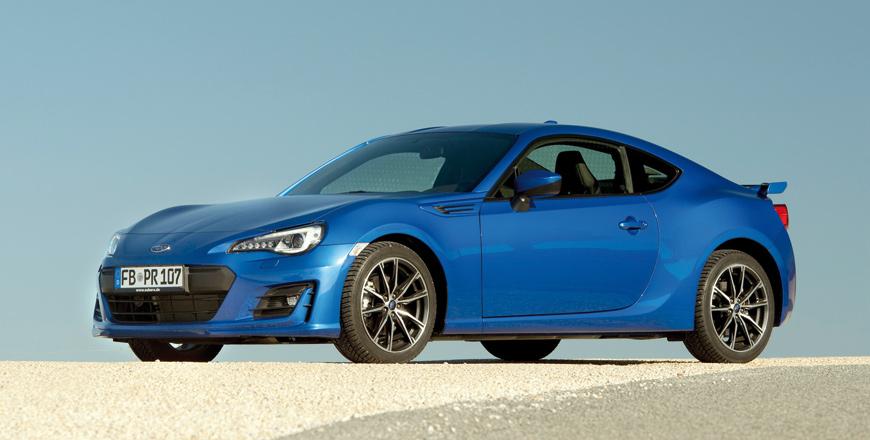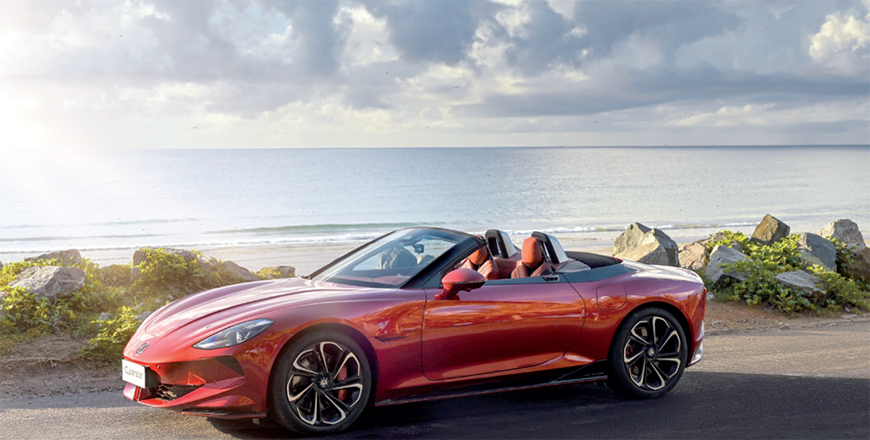You are here
Subaru BRZ: Attainable, yet, visceral thrills aplenty
By Ghaith Madadha - Mar 09,2021 - Last updated at Mar 09,2021

Photo courtesy of Subaru
A back-to-basics naturally-aspirated rear-drive sports car with restrained power and weight, the Subaru BRZ is an attainable sports car designed with a focus firmly on good old fashioned fun. With a clear emphasis on handling agility and driver engagement above most else when first launched in 2012, the BRZ was as much a departure from Subaru’s traditional turbocharged, four-wheel-drive playbook, as its Toyota 86 twin was a break for Toyota from the conventional, conformist and less than thrilling image it had then cultivated.
With a successor generation already announced and expected soon, the face-lifted first generation BRZ has perhaps never been as enticing and is still seemingly available in certain markets, as carmakers move towards much feted yet un-involving, non-visceral and ultimately un-exciting technologies. Engineered primarily by Subaru, with design and fuel injection courtesy of its Toyota shareholder, the BRZ is virtually unaltered since initial launch and through its face-lift, and is also virtually identical to its Toyota, and now defunct Scion sister models.
Classic proportions
A light, balanced and involving drive built using a compactly packaged and low-mounted front “boxer” engine on a rear-drive platform, the BRZ is a handsomely sporty machine with classic rear-drive proportions, including a low and long hood, and low sloping roofline, tapering to a fastback-like (non-hatch) rear deck. Little different in styling to its Toyota sister bar a more upright and arguably better looking fascia, the BRZ was meanwhile little altered for 2016, with lightly re-styled bumpers and lighting elements being most prominent.
With a rearwards cabin and front-mid engine layout from profile, the BRZ features a low-slung hexagonal grille and slim swept-back headlights with a semi-circular outside kink, for a shark-like demeanor. Sporting details include an air splitter, rear spoiler, side ports and dual exhaust pipes set within a rear air diffuser lower element, while a predominantly red rear light cluster replaces its predecessor’s clear casing. Defined side haunches lend the BRZ presence and tone, but larger rear tyres and wheels would have better filled out its wheel arches and provided better rear grip
Peaky and punchy
Powered by a naturally-aspirated horizontally-opposed 2-litre 4-cylinder engine driving the rear wheels in classic sports car configuration, the BRZ develops 197BHP at 7000rpm and 151lb/ft torque at 6400-6600rpm. A peaky, eager and high-rev engine with a low rev staccato rumble and more manic engine note higher up the dial, the BRZ’s “boxer” engine is not merely more rewarding near its redline, but is one practically begging to be revved with abandon, and allows for conservatively stated 7.6-second 0-100km/h acceleration and 226km/h top speed.
A different proposition to Subaru’s muscularly meaty, surging, high-gripping and iconic turbocharged four-wheel-drive WRX STI, the BRZ is instead free-revving and progressive in delivery, with its best arriving at the top-end. Building power in linear fashion, it isn’t exactly a muscle car at lower revs, but the fun is in exploiting its eager rev nature and throttle control precision for inputting or dialing back power with crisp clarity. Meanwhile, its light, accurate short-throw gear shifts and delicate yet intuitive clutch are highly rewarding.
Crisp control
A happy medium between a hardcore lightweight Caterham Seven and a practical performance hot hatch, the Subaru BRZ weighs in at just 1,258kg and delivers brisk performance for affordable thrills, yet seems a tempting prospect for more power. That said, it is a light, perfectly balanced, un-fussed, sensible and pragmatic sports car for eager every day driving. Best enjoyed driven hard, the BRZ isn’t as tail-happy and drift-oriented as reports suggest its’ Toyota sister is, with rear suspension instead seemingly calibrated for better road-holding.
Engagingly exacting and able to cover ground at a quick pace, the BRZ nicely balances crisp handling, intuitiveness and decent rear grip. Quick and light steering is accurate and the front wheels bite hard on turn-in, while a low centre of gravity and taut suspension ensure good cornering body control. With excellent throttle control and modest torque, one can meanwhile come back on throttle early without unexpected rear drift. That said, accurately progressive and intuitive tail slides can be initiated on a whim.
Clarity and character
An agile, connected and visceral drive, the BRZ is stable, settled and smooth, if on the firm side over jagged lumps and bumps. Sitting low and upright, the BRZ’s hunkered driving position is alert and well-adjustable, with supportive body-hugging sports seats and good visibility over its long, low bonnet. Cozy but not uncomfortable in front but limited in rear passenger space, the BRZ’s cabin is distinctly sporting, with small chunky steering wheel and stiff, stubby and precise short-throw gear lever falling nicely to hand.
With thin insulation enhancing its viscerality, one distinctly hears the BRZ’s throbbing “boxer” engine and gearbox linkages at work, while controls and instrumentation are clear and user-friendly. Styling is sporty but not over-stated or ostentatious, and keeps to its core characteristics. Easily maneuvered and placed, even with shoulder pressed to the door, the BRZ is however no stripped down racer, and is equipped with modern safety features and conveniences. Boot space is meanwhile adequate at 218-litres, but reduced by an optional above-floor spare tyre.
TECHNICAL SPECIFICATIONS
- Engine: 2-litre, horizontally-opposed 4-cylinders
- Bore x stroke: 86 x 86mm
- Compression: 12.5:1
- Valve-train: 16-valve DOHC, direct-injection
- Gearbox: 6-speed manual, RWD, Torsen limited-slip rear-differential
- Gear ratios: 1st 3.626:1; 2nd 2.188:1; 3rd 1.541:1; 4th 1.213:1; 5th 1:1; 6th 0.767:1
- Reverse / final drive ratio: 3.437:1 / 4.1:1
- Power, BHP (PS) [kW]: 200 (197) [147] @7,000rpm
- Specific power: 98.6BHP/litre
- Power-to-weight: 156.6BHP/tonne
- Torque, lb/ft (Nm): 151 (205) @ 6,400-6,600rpm
- Specific torque: 102.6Nm/litre
- Torque-to-weight: 163Nm/tonne
- 0-100km/h: 7.6-seconds
- Top speed: 226km/h
- Fuel consumption, urban / extra-urban / combined: 10.4-/6.3-/7.8-l/100km
- CO2 emissions, combined: 180g/km
- Fuel capacity: 50-litres
- Length: 4,240mm
- Width: 1,775mm
- Height: 1,320mm
- Wheelbase: 2,570mm
- Track, F/R: 1,520/1,540mm
- Ground clearance: 120mm
- Kerb weight: 1,258kg
- Boot capacity: 218-litres
- Suspension, F/R: MacPherson struts / double wishbones
- Steering: Electric assistance, rack & pinion
- Lock-to-lock: 2.48-turns
- Turning circle: 10.8-metres
- Brakes: Ventilated discs
- Tyres: 215/45R17
Related Articles
A sign of the increasing sophistication of Japan’s automotive industry and its rapid ascent and reputation for quality, reliability and valu
A storied near century-old brand, MG began life as a British manufacturer but passed into Chinese ownership in 2006.
First launched in2015, the Jaguar XE was intended to be the premium British automaker’s more accessible entry-level model that should also b

















